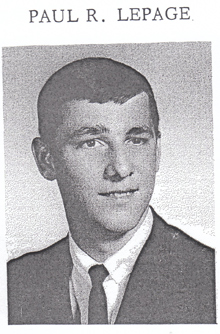When Gerard LePage turned 18 and was drafted to fight in the Second World War, he was assigned to a field artillery training regiment and, according to his service record, sent to Fort Bragg, North Carolina, for training in March 1943. His fellow enlistees participated in the invasion of the Italian mainland that fall, but Gerard did not. He had been given an honorable discharge from the Army in August on account of "inaptness," a designation the army's Office of Medical History says was given to an individual "considered to possess defects of intelligence or personality which exculpated his inability to render adequate service." He returned to his parents' home on Lisbon Street and found a job at the Androscoggin Division of the Bates Mill. He married Teresa Gagnon in April 1947, by which time he had a son from a prior relationship, according to Gov. LePage's brother, Maurice.

GRADUATING HIGH SCHOOL LePage’s senior yearbook photo at Lewiston High School. |
After their fourth child was born in 1953, Gerard and Teresa moved to the tenements of Little Canada, the densely populated Franco-American neighborhood squeezed between the textile mills on the Lewiston riverfront. French was most everyone's first language, children were schooled by nuns and priests at St. Mary's grammar school, and regular church attendance was the norm. Little Canada had earned a bad reputation in decades past, allegedly a scene of crime, disease, and unsavory social clubs. "In high school, I'd ask the kids I played hockey with to come down to my neighborhood and play in my yard," recalls Roland Moreau, who lived a few doors down Lincoln Street from the LePages and was one of Paul's classmates. "They'd talk to their parents and they'd say, 'no, you can't go down there — that's a bad neighborhood!' It wasn't really like that in our generation, but if you were from Lincoln Street, you were considered to be from the wrong side of the tracks."Little Canada was also a tight-knit neighborhood in a city and time where people watched out for their neighbors' children. Lincoln Street's many children played in a park near the LePages' tenement building — kick the can in the summer, snowball fights in the winter — swam in a nearby public pool, or lined up at the local fire station to be fitted for hand-me-down skates. Sam Alpren, who owned a steel-products business across the street from the LePages, would occasionally drive two or three impoverished children to the downtown department stores, fit them with new sets of clothing, and drop them off at their doorsteps. "The adults knew what Sam was doing, but he didn't want to be thought of as a hero, he just felt you had to do something for the kids every once in a while," Moreau recalls. "There was goodwill in the neighborhood, and it was down almost in a whisper, because they didn't want to make people feel like they had a handout."
 Topics
Topics:
News Features
, Politics, Portland, Lewiston, More  , Politics, Portland, Lewiston, Paul Lepage, Husson College, Governor LePage, Less
, Politics, Portland, Lewiston, Paul Lepage, Husson College, Governor LePage, Less 